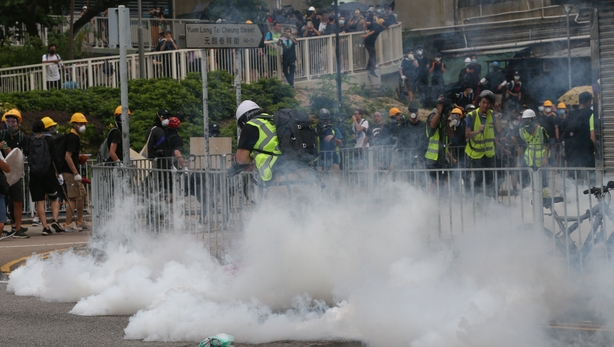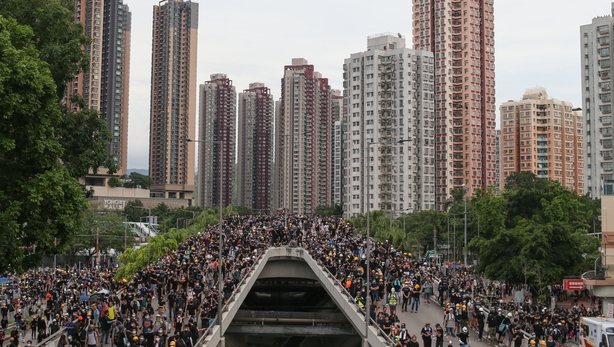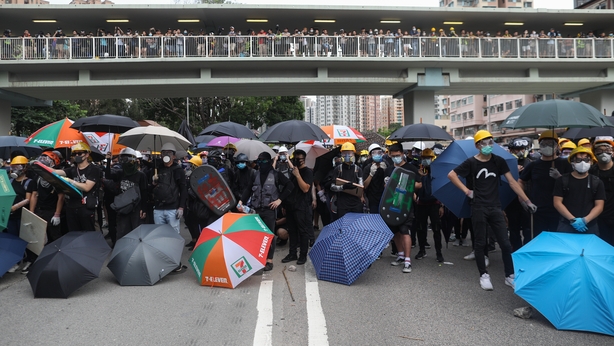Hong Kong police have fired tear gas at protesters holding a banned rally against suspected triad gangs who beat up pro-democracy demonstrators near the Chinese border last weekend.
Riot police fired tear gas and rubber bullets in Yuen Long after tense standoffs with protesters, some of whom were throwing projectiles and had surrounded a police van.
An AFP reporter in Yuen Long saw multiple rounds of tear gas and rubber bullets fired towards some 200 demonstrators who used umbrellas to shield themselves from the incoming rounds.
Public anger has been raging since last Sunday when a gang of men in white t-shirts, armed with poles and batons, set upon anti-government protesters and bystanders in Yuen Long station, leaving at least 45 people needing hospital treatment.
The brazen assault was the latest escalation in seven weeks of unprecedented political violence that shows little sign of abating as the city's pro-Beijing leaders refuse to budge.


Thousands of people have turned out to protest today.
Police have been heavily criticised for being too slow to respond to last Sunday's violence, fueling accusations of collusion or turning a blind eye to the pro-government mob - allegations the force has denied.
Hong Kong has been plunged into its worst crisis in recent history after millions of demonstrators took to the streets - and sporadic violent confrontations erupted between police and pockets of hardcore protesters.
The demonstrations were triggered by a controversial bill which would have allowed extraditions to mainland China, but have evolved into a call for wider democratic reforms and a halt to sliding freedoms.
Today's unrest compounds the political crisis with the city's pro-Beijing leadership seemingly unable, or unwilling, to end the chaos.
In a rare move, police banned today's rally saying they feared reprisal attacks against villagers from protesters.
Social messaging channels used to organise the largely leaderless movement quickly filled up with vows from people to join in.
Some suggested holding a "shopping spree" in Yuen Long, others for a mass gathering of Pokemon Go, a popular mobile phone game.
Huge crowds spilled out of Yuen Long's main station this afternoon and into surrounding streets where police maintained a large presence but kept their distance. Many shops were shuttered.

Large plastic barriers filled with water surrounded the local police station which was shuttered.
The most common chant outside was "hak ging" - black cops - a pun on the a phrase to describe triads: black societies.
Yuen Long is in Hong Kong's New Territories, a rural area where many of the surrounding villages are known for triad connections and their staunch support for the pro-Beijing establishment.
Police say they have arrested 12 people so far in connection with Sunday's violence, nine of whom have known triad links.
Rumours have swirled that protesters might target the ancestral halls and graves of a village close to the Yuen Long's station where the white shirt mob ran into after their attack and later left without police making any arrests despite a large presence of officers.
Weeks of unprecedented protests with huge turnouts - as well as frequent clashes and the sacking of parliament - have had little luck persuading Beijing or Hong Kong's leaders.
Beijing has issued increasingly shrill condemnations in the last fortnight, but has left it to the city's semi-autonomous government to deal with the situation.
Hong Kong Chief Executive Carrie Lam has shown no sign of backing down beyond agreeing to suspend the extradition bill.
On Friday thousands held a ten-hour protest at the airport arrival hall in a bid to "educate" visitors about their movement - especially those on the Chinese mainland where news is heavily censored.
The protest was peaceful and there was no disruption to flights.
Protesters also plan to march on Sunday through a district where riot police fired tear gas and rubber bullets at projectile-hurling protesters the week before.
Police have allowed a rally to take place, but denied protesters permission to march, raising the likelihood of further confrontations.

